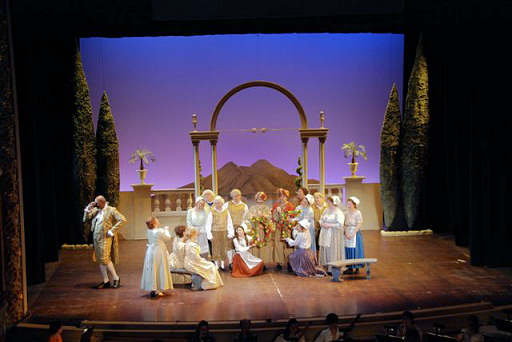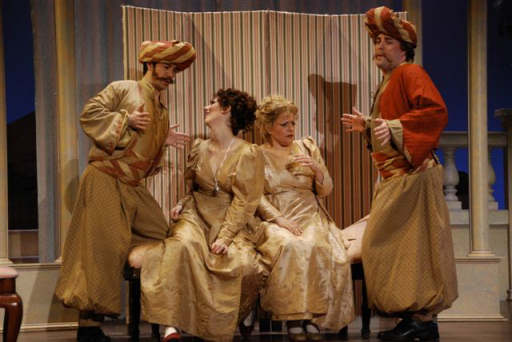Other Links
Editorial Board
- Editor - Bill Kenny
- London Editor-Melanie Eskenazi
- Founder - Len Mullenger
Google Site Search
SEEN AND HEARD INTERNATIONAL OPERA REVIEW
Mozart, Così Fan Tutte:
Soloists, orchestra, and chorus of Granite State Opera, Philip
Lauriat (Music Director), Portsmouth, New Hampshire 9.5.2008 (LS)
Music Director-Philip Lauriat
Stage Director-John Bowen
Production Manager-Taylor Rodgers
Production Stage Manager-Jennifer Moody
Assistant Stage Manager-Marlena Hipke
Lighting Designer-Quentin Stockwell
Wigmaster/Makeup-Molly Weinrab
Propmaster-Nathan Keyes
Chorus Master and Rehearsal Pianist-Michelle Alexander
Rehearsal Pianists-Anna Maria Dwyer, Miles Goldberg
Costumes-Patricia Hibbert
Wardrobe Assistant-Helen Aure
Supertitles -Raymond Street Translation
Projectionist-David D'Agostino
Set Design-Arthur Ridley for Univ. of Michigan School of Music,
Theatre & Dance
Cast:
Ferrando-Jason Karn
Guglielmo-Ross Benoliel
Don Alfonso-Phil Lima
Fiordiligi-Theresa Cincione
Dorabella-Meredith Ziegler
Despina-Heather Parker
Despina congratulates the women and Don Alfonso counsels immediate
marriage saying Così fan tutte - "all women are like that".
Despina disguises herself again as a notary and the ceremony is
completed just as the "soldiers" return from the battlefield. Chaos
reigns and ultimately the plot is revealed. Don Alfonso admits the
deception but urges forgiveness. In most productions, the original
lovers indeed forgive each other and the opera ends happily. But,
not in Portsmouth. Lauriat and Bowen preferred an ambiguous ending.
Indeed it is not clear whether there will be one, two, or no
marriages - and if there are, who will marry whom.
Chaperone (Non singing)-Nina Eppes

Così Fan Tutte (or The School for Lovers) is perhaps Mozart's
most controversial opera. Lorenzo da Ponte's libretto is all about
fiancée swapping. The libertinism of the text shocked viewers of
the 19th and even the early 20th century. The well known opera
historian Alfred Loewenberg once stated: "No other opera, perhaps,
has been subjected to so many different versions and attempts to
'improve' the libretto". Indeed, it wasn't performed in the United
States until 1922.
Granite State Opera's delightful performance featured traditional
and not so traditional features. The curtain rose immediately and
while the overture played, the audience could see the two soon to
be wedded couples (Ferrando and Dorabella, Guglielmo and Fiordiligi)
enjoying a meal at the home of Don Alfonso. The setting is 1817
rather than 1790. Philip Lauriat explained: "We've chosen to set
this production in 1817…(because) with PBS, etc, people know more
about the stories of Jane Austin than about Les Liaisons Dangereuses. That's important, because this opera is all about the
relationships between men and women at that constrained time, and
the formality in those relationships that is no longer part of our
social vernacular."
When the ladies retire, Don Alfonso challenges Ferrando and
Guglielmo to a wager. He says that the sisters Fiordiligi and
Dorabella will prove to be unfaithful. The two men are shocked but
agree -certain that they will win the bet.
Don Alfonso tells Fiordiligi and Dorabella that their fiancées have
been called to battle. After they depart, the action begins.
Despina, the sister's maid, advises the sisters to enjoy themselves
while their lovers are far away. Don Alfonso promises Despina a
reward if she'll help him win. The lovers, disguised as rich
Albanians, suddenly appear and begin wooing each other's fiancée.
Their first advances are repelled. The Albanians in their misery
take "poison" and Despina pretending to be a doctor cures them with
a huge magnet. They seek sympathy with kisses, but once again are
rebuffed. The first act ends with the lovers certain they will win
Don Alfonso's money.
Act II finds Despina again counseling Dorabella and Fiordiligi that
"any girl of fifteen years" should enjoy flirtations. The women
choose between the Albanians and the couples switch affections.
Dorabella is the first to succumb and accepts a heart locket from
Guglielmo , but Fiordiligi continues to reject Ferrando. Ferrando
tells Guglielmo that Fiordiligi is faithful, but Guglielmo shows
Ferrando the locket-- evidence that Dorabella has abandoned her
distant soldier. Ferrando is enraged and Guglielmo bemoans the
ingratitude of women. Fiordiligi threatens to disguise herself as a
soldier and follow Guglielmo to the battlefield. but finally gives
in and accepts Ferrando's advances.

Così requires six excellent singers and for them most part
the Granite State Opera cast was up to the challenge. Theresa
Cincione played the demanding role of Fiordiligi. Her Act I aria
Come scoglio (like a rock) is a show stopper in the same
category as The Magic Flute's Queen of the Night aria Der H
The tall thin mezzo soprano Meredith Ziegler displayed a very beautiful voice and acted the role of the flighty Dorabella with gusto. She was very effective in her duets with Cincione. Ms. Ziegler's career has just begun. She took second place in the Connecticut Opera Guild's Scholarship Competition (2006), second place in the 2007 Amici Vocal Competition, and was a Regional Finalist in the 2007 New England Metropolitan Opera National Council Auditions. Her appearances have included Dido in Dido and Aeneas, Meg Page in Falstaff, Hansel in Hansel and Gretel, and the mezzo soloist in Mozart's Requiem. Hopefully we will hear her name more often in the years to come.
Heather Parker came close to stealing the show with her fine voice and excellent acting as the wily Despina. She too, is well known in New Hampshire having performed with Granite State Opera as Adina in L'Elisir d'Amore and Susanna in Le Nozze di Figaro and as Despina and Susanna for Opera North. Her credits also include Antonia in Seattle Opera's production of Tales of Hoffman, Musetta in La Bohème, and Micaela in Carmen. She is scheduled to sing Zerlina in Don Giovanni with Seattle Opera.
Jason Karn as Ferrando made his New York debut in 2007 at Dicapo Opera as Romeo in Romeo et Juliette and received a quite favorable review from the New York Sun Times. He is also one of the up and coming young artists having begun his performing career at the 2004 Chautauqua Opera Festival. His roles during the past four years have included Tamino in The Magic Flute, Spoletta in Tosca, Fenton in Falstaff, Alfredo in La Traviata, and Nemorino in L'Elisir D'Amore. Karn sang and acted well, but was upstaged in my opinion by Ross Benoleil's Guglielmo.
In its most recent efforts Granite State Opera has been quite successful finding exciting baritones. In last year's Lucia Di Lammermoor it was Jimi James as Enrico. Ross Benoleil brought a superb voice and fine acting to Così, although I must admit that some of the gestures he used to put the make on Dorabella seemed more associated with the 21st century than the 19th. He was an international finalist in Placido Domingo's 2006 Operalia Competition, a finalist in the New England Region of the Metropolitan Opera National Council Auditions, and the 2008 prize winner in the Liederkranz Foundation Vocal Competition. His roles have included Figaro in the Barber of Seville, Valentin in Faust, and the premiere of the role of Reverend John Wilson in Margaret Garwood's The Scarlet Letter.
Rounding out the male cast was the large imposing Philip Lima as Don Alfonso. His bass voice was beautiful, but I thought pitched a bit too high and light for the sinister Don Alfonso. Perhaps this reflected his marching orders by the musical director. His recent credits have included Alfio and Tonio in Granite State Opera's productions of Cavalleria Rusticana and Pagliacci, Trinity Moses in Opera Boston's The Rise and Fall of the City of Mahagonny, Johann Mattes in Die Burgschaft, Cadmus in Semele, John Proctor in The Crucible, and Alidoro in La Cenerentola. Thus, the breadth of his repertoire is astonishing ranging from Handel, Rossini, Mozart, and Haydn to Weill, Mahler, Ullmann, and Orff.
The production was light, bright, and airy, in contrast to others such as Opera Zurich's setting in a gloomy university with Don Alfonso as a scheming professor. Transitions were made from outdoors to indoors effortlessly. The costumes were also well done.
Così is a long opera replete with dialogue. As such it poses a major production problem, particularly in the second act. If the acting is relatively static, the result can be tedium and boredom. But if the pace is picked up and embellished with activity the opera can turn into a superficial comedy. Although at times during the first act I thought that perhaps the action was a bit over the top, I felt that Lauriat and Bowen achieved the appropriate balance.
The chorus had a relatively minor role singing with competence the beautiful Bella vita militar. The orchestra performed admirably under Lauriat's direction with major kudos to the french horns and trumpets. Although perhaps not quite as exciting as last season's Lucia Di Lammermoor, Granite State's Così still deserves high marks and I look forward to future productions.
Lew Schneider
Pictures © PernoldPhoto.com
Back to Top Cumulative Index Page
